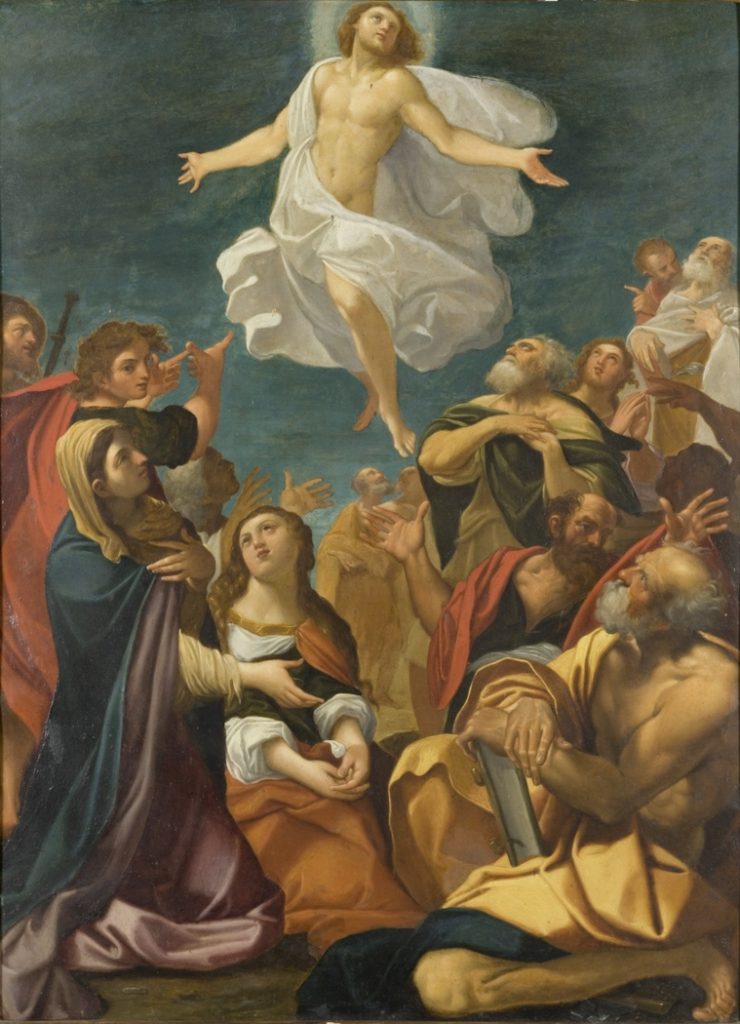
Ascension Sunday
My dear friend Sue Schmidt, a frequent contributor to this blog who is currently going through ordination, writes today’s post. She is as fond of the metaphysical poets Henry Vaughan and George Herbert as I am.
By Sue Schmidt
Ever since Easter morning, I’ve been puzzling over why Jesus said to Mary Magdalene when he saw her in the garden, “Tell the disciples that I am going to ascend to my Father and your Father, to my God and your God” (John 20:17). This phrase seems like it comes out of nowhere. How is this helpful for Mary or the disciples?
Why not say, “Mary, I’m glad to be back. I have lots to tell you.” Or, “The grave has been destroyed, isn’t that good news?”
Thankfully, the lectionary a few weeks ago had me in John 14, just a few chapters before the resurrection story. There we see Jesus spending significant time talking to his disciples about his death and his return to the Father (his ascension). This is necessary, he says, for three reasons: he is going there to prepare a place for his disciples; he has to go so the Holy Spirit can come; and he leaves so that he can act for the disciples as they pray in his name. His death, his resurrection and his ascension are all necessary for the ongoing mission of bringing God’s kingdom to earth.
On Ascension Day, we celebrate the completion of Jesus’s mission on earth. We also marvel that a humanized member of the Godhead has returned to his rightful place as the energizing Word of God. Jesus not only understands what it is to be human. He also has the power to help us as we seek our own transformation, and that of the planet as well. What good news in this time of uncertainty, where we see so clearly the ignorance and hate that still plague humanity!
In looking for poetry celebrating the Ascension, I came across “Ascension Hymn” by Henry Vaughan who, along with George Herbert, was one of the 17th century British religious poets. Vaughan speaks of the possibility of ascension for all of us.
Walking to the sky will require our willingness to die, he indicates, just like the seed that falls into the ground. Death involves letting go of the garments that are soiled from sin, the result of fear and lies. The power for transformation comes from the one who left heaven to rebuild fallen man.
Like a fuller (one who beats clothing to wash it), Jesus can make us whiter than snow. Like the transfigured Lord, we can regain the glory we had when we lived within the lines (boundaries) of Eden. Echoing Ezekiel and the valley of dry bones, Vaughan assures us that we will be rebuilt bone to bone and all will one day be glorified like Jesus.
Happy Ascension Sunday! May you rise with the risen Lord.
Ascension Hymn
By Henry Vaughan
Dust and clay
Man’s ancient wear!
Here you must stay,
But I elsewhere;
Souls sojourn here, but may not rest;
Who will ascend, must be undrest.
And yet some
That know to die
Before death come
Walk to the sky
Even in this life; but all such can
Leave behind them the old Man.
If a star
Should leave the Sphere,
She must first mar
Her flaming wear,
And after fall, for in her dress
Of glory, she cannot transgress.
Man of old
Within the line
Of Eden could
Like the Sun shine
All naked, innocent and bright
And intimate with Heav’n as light;
But since he
That brightness soiled,
His garments be
All dark and spoiled,
And here are left as nothing worth
Til the Refiner’s fire breaks forth.
Then comes he!
Whose mighty light
Made his clothes be
Like Heav’n al bright;
The Fuller, whose pure blood did flow
To make stained man more white than snow.
He alone
And none else can
Bring bone to bone
And rebuild man,
And by his all subduing might
Make clay ascend more quick than light

